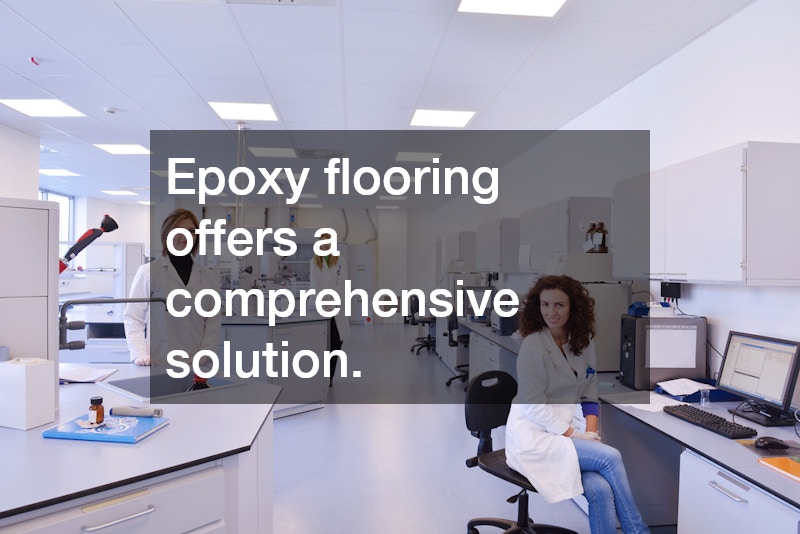In the highly regulated pharmaceutical industry, maintaining a clean and controlled environment is of utmost importance. Cleanrooms serve as a critical component where sterile and contamination-free zones are required. One key element that contributes to maintaining these pristine conditions is the choice of flooring material. This article explores why epoxy flooring for pharmaceutical industry is the best choice for cleanroom compliance, providing a detailed look into its advantages and why it’s considered a leading solution.
Introduction to Epoxy Flooring in Pharmaceuticals
Epoxy flooring is increasingly becoming the preferred choice for many pharmaceutical facilities. The demand for robust and seamless flooring solutions that meet strict compliance standards is constantly rising, thus making epoxy a compelling option.
This introduction will outline the basic features of epoxy flooring, setting the stage to understand its significance in cleanroom environments.
Epoxy flooring is composed of epoxy resins and hardeners that chemically react to form a hard plastic surface. It is known for its durability, chemical resistance, and seamless finish, characteristics essential for pharmaceutical environments. The combination of these properties makes it a practical solution for cleanrooms where exposure to harsh chemicals and substances is common.
In addition to its durability and resistance, epoxy flooring also offers versatility in design and application. The ability to customize the flooring to fit any space without compromising on the quality is a unique advantage that it offers. Many pharmaceutical companies prioritize this flexibility as it helps in tailoring the cleanroom environments to specific operational needs and standards.
Benefits of Epoxy Flooring in Pharmaceutical Cleanrooms
One of the most significant benefits of epoxy flooring for the pharmaceutical industry is its seamless surface. Seamlessness ensures minimal joints and crevices, reducing the potential for bacterial growth and contamination, an essential factor for cleanrooms. The ability to effectively maintain these flooring types makes them highly desirable in controlled environments.
The durability and chemical resistance of epoxy flooring make it a wise investment for pharmaceutical companies. This type of flooring can withstand rigorous cleaning protocols, exposure to chemicals, and heavy equipment usage without substantial wear and tear. The reduced frequency of repairs and replacements further enhances its cost-effectiveness over the long term.
Epoxy flooring also enhances the safety and compliance of cleanrooms with its slip-resistant properties. By minimizing the risk of slips and falls, it contributes to a safer work environment and helps adhere to safety regulations. The combination of these benefits aligns with the industry’s goals of maintaining sterile and safe conditions.
Compliance Elements of Epoxy Flooring
Cleanroom compliance is a critical aspect of the pharmaceutical industry, with regulatory bodies enforcing stringent standards. Epoxy flooring supports adherence to these standards by providing a surface that is easy to clean and sterilize. The ease of maintenance ensures that cleanrooms remain free of contaminants and comply with the approved guidelines and practices.
The seamless and non-porous nature of epoxy flooring prevents the accumulation of dust and microorganisms. This characteristic is vital for cleanrooms, where purity and contamination control are priorities. Pharmaceutical facilities often rely on epoxy flooring to meet cleanliness levels required by ISO standards, thereby ensuring operational compliance.
Additionally, epoxy flooring can be integrated with specialized coatings that provide anti-static properties. These coatings minimize the risk of static discharge, which is crucial when handling sensitive pharmaceutical products and equipment. Thus, the flooring solution not only meets aesthetic and structural standards but also functional requirements for cleanroom compliance.
Epoxy flooring for the pharmaceutical industry is the best choice for achieving cleanroom compliance. Its seamless finish, durability, chemical resistance, and customizability contribute to maintaining sterile and regulated pharmaceutical environments. By choosing epoxy flooring, pharmaceutical companies can ensure long-term, reliable compliance with cleanroom standards while also enhancing safety and operational efficiency.
As the pharmaceutical industry continues to innovate and expand, the need for dependable and efficient cleanroom solutions will also grow. Investing in epoxy flooring not only meets current compliance needs but also prepares facilities for future developments and challenges. With its myriad benefits, epoxy flooring truly stands out as the optimal choice for cleanrooms in the pharmaceutical sector.
Ultimately, the choice of flooring plays a pivotal role in the pharmaceutical industry’s commitment to maintaining high standards of cleanliness and safety. Epoxy flooring offers a comprehensive solution that supports these goals, making it not only a smart investment but a fundamental component of success in cleanroom environments.
.

